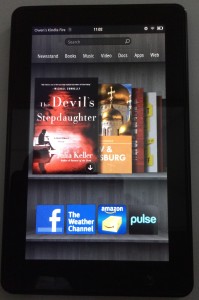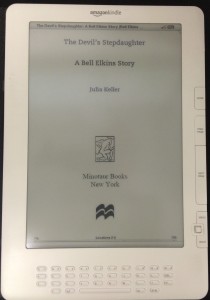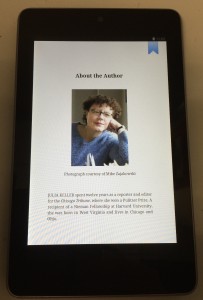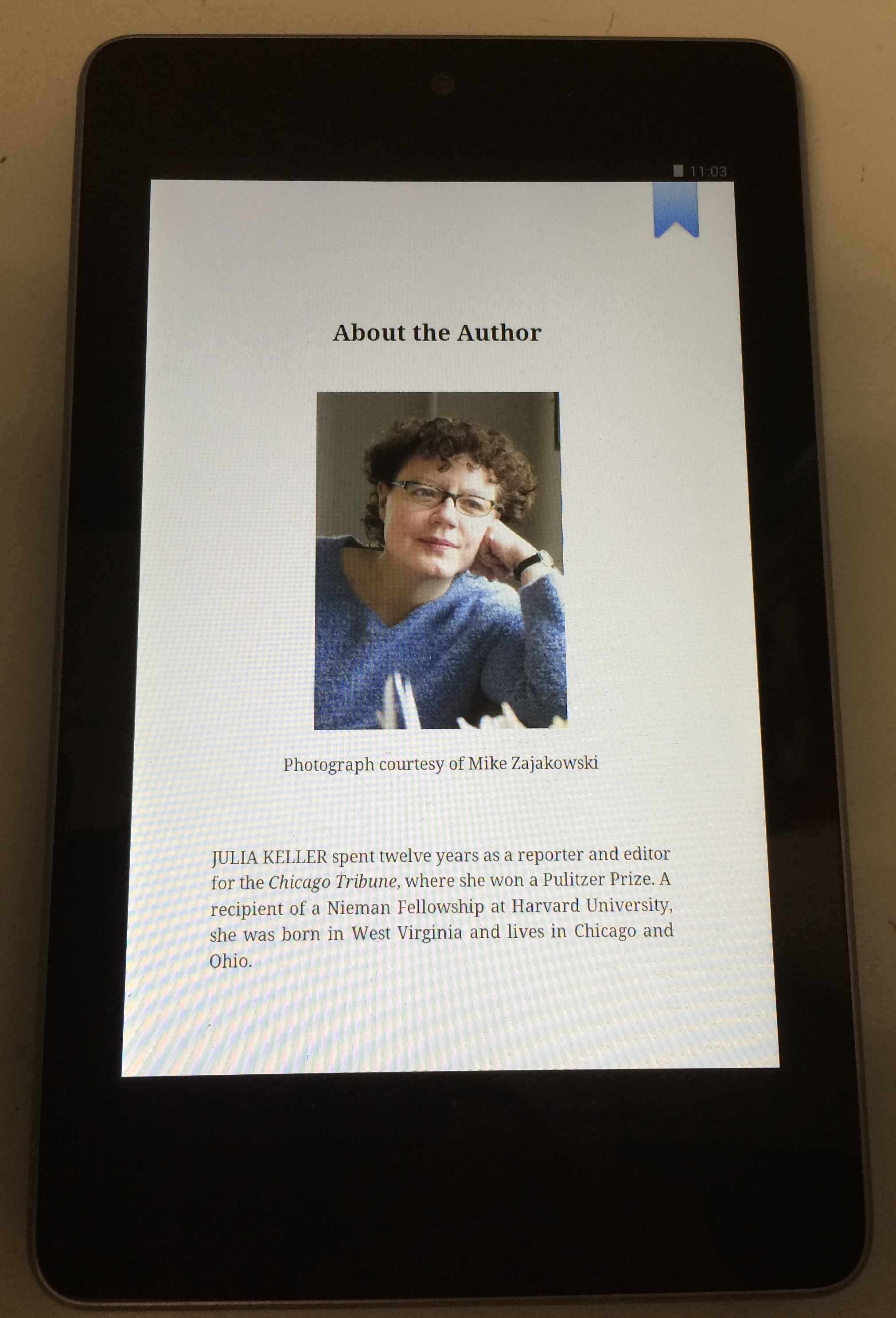

 Looking at Julia Keller’s new e-short story: My Kindle Fire, Kindle DX, and Nexus 7. Admittedly, none of this hardware is of recent vintage…
Looking at Julia Keller’s new e-short story: My Kindle Fire, Kindle DX, and Nexus 7. Admittedly, none of this hardware is of recent vintage…
This Saturday (June 7), I’ll be returning to the Chicago Tribune Printers Row Lit Fest for the first time in a couple of years. It’s the 30th anniversary of an event that was called the Printers Row Book Fair when we acquired it from the Near South Planning Board a dozen years ago. My longtime colleague and Tribune literary editor Elizabeth Taylor invited me back for a panel called “The Digital Revolution,” its general topic being “the many digital developments that are transforming the publishing industry.” (Event details at the end of this post.)
As it happens, the first thing that Liz and I worked on together was itself a “digital development”—a standalone Web site for the Tribune books section called “Chicago Books,” developed for us by Jimmy Guterman and which launched in August of 1997 even though only a fraction of the section’s readers were yet even online — and when, according to my files, a week of 30,000 Books page views was a big deal. (If you want to re-enter that version of the world, check out this piece by Donna Seaman from that month: “Learning to Crawl: Book Lovers Go On-Line.”)
Also as it happens, this is also the week in my Coursera MOOC “Understanding Media by Understanding Google” where one of the two topics being discussed is the impact of the Web in general, and Google in particular, on the book business (the other is the news business). One of the ideas I have put out for agreement or disagreement is taken from Steven Levy’s In the Plex, in which he quotes librarian John Wilkin of the University of Michigan: “Twenty years from now, interaction with a physical book will be rare. Most of that interaction will be in the study of books as artifacts.”
Does my worldwide student body agree? They’d rather work through an answer than announce one. For example:
“Print as a medium has some advantages and it’s those advantages that will ensure a future for the medium:
- Three-dimensional and tactile.
- Consumable.
- Collectible and permanent.
- Handcrafted. Big, beautiful photos on hq paper—coffee table books.
- Tech free.
- Visible and accessible in retail environments.”
Or this:
“The best comparison of books, in my mind, is Vinyl. Vinyl is an outdated technology and has been for 40 years. However, the industry is not dead. It continues to exist as a niche and companies continue to produce records for many popular albums. Books will most likely go the same way: as a mode of reading for those who still prefer the feel of a book, much as people still prefer the sound of a record.”
There’s plenty more, especially as the students react to the chapter in Siva Vaidhyananthan’s book The Googlization of Everything that’s titled “The Googlization of Knowledge.” But what are authors thinking (and, not incidentally, doing) at this juncture? It’s a not inconsequential question for many reasons, one of them of course the current dustup between Amazon and Hachette that some informed parties say is mostly about e-book prices.
In a third instance of complete happenstance, this is also the week that another longtime Tribune colleague, Pulitzer Prize winner Julia Keller, is releasing a prequel to her two well received mystery novels exclusively as an “e-short story”: If you “wonder how Belfa Elkins became who (and how) she is, today’s the day you can read an e-short story that solves the mystery,” she said on her Facebook writer’s page on Tuesday. What a great chance to get some current, first-hand thoughts on “digital developments,” right? So I asked her to share the story of the e-story.
“Both the e-short story (“The Devil’s Stepdaughter”) and the e-novella that will appear in the fall (“The Haunting of the Bones”) were my print publishers’ idea (St. Martin’s in the U.S., Headline in the UK),” she writes. “With about a year between novels, they wanted something to keep the characters and settings in front of readers. Hence the notion of exclusively e-published works.
“The next full-length novel in the series, Summer of the Dead, will come out August 26 in the usual multiple platforms: print, audio, e-book. I recently signed another multi-book deal with my publishers, in which I agreed, once again, to provide shorter works for electronic distribution between the full-length novels.
“E-publication is increasingly being used this way: as a supplement — rather than alternative — to print publication. I loved being able to explore an aspect of the early life of my protagonist that I might not have been able to include in a full-length novel.”
Like me, Julia has wound up in academia, so we also conversed about our observations about students. The first time I taught the on-campus version of the current MOOC at Northwestern, I gave the students a choice of buying e-books or physical ones, and at quarter’s end asked about the experience. Interestingly, some of the best ones said that it was much harder to absorb information from pixels than from print, in part because they were so aware that they could click away from the e-book at any time to text or g-chat.
One of my MOOC students addressed this, too: “I went to a workshop on e-textbooks recently. The presenters suggested that students use e-texts differently than they do hard copy textbooks. Students are more likely to search for the words/concepts they need to complete the assignment than they are to at least skim the whole chapter, section, etc. I think, in this case, e-books are making acquisition of knowledge more fragmented and less able to provide the big picture.”
In her case, Julia writes, “Many of my students at Ohio University indeed use e-readers, but I have to say, those younger readers — people in their late teens and early 20s — are still very attached to print, to the notion of ‘holding a book in your hands,’ just as I am. At first I was surprised by that, believing myself to be a fuddy-duddy because I like to smell books, to run my hand over the cover and to insert a battered, well-worn bookmark to mark my place. But it was gratifying to discover that apparently there is something human — unrelated to age or generation — that responds to a tangible object known as a book.”
(Aside: Ah, the smell of books! At once I am reminded of a recurring theme in Gary Shteyngart’s 2010 novel “Super Sad True Love Story,” where the biggest problem with books in his dystopian near future is, well… “I noticed that some of the first-class people were staring me down for having an open book,” the narrator writes of an experience on an airplane. “ ‘Duder, that thing smells like wet socks, ‘ said the young jock next to me.” And later: “I thought about the terrible calumny of the new generation: that books smell.” The protagonist owns thousands of these artifacts and writes lovingly and often of his Wall of Books. More than anything else, they mark him as a person who just doesn’t fit in a troubled, consumption-oriented, disintegrating world.)
Back to Julia: “I want to make sure that there’s no misunderstanding about why I — or any author — would offer a new work exclusively in e-format. I think the days when e-publication carried the stigma of second-class status are long gone. A good analogy would be a dramatic work that appears, say, on cable instead of broadcast; there was a time, certainly, when cable venues were regarded as the last refuge, drawn from the pile of network rejects. No more.
“I think this is an incredibly exciting time to be a writer, a creator. I should add, however, that as a creator, I don’t spend a lot of time contemplating formats. I write stories. I leave it to my agent and my publisher to figure out in what form those stories should go out into the world and (God willing!) attract an audience.”
And there you have it, or at least one part of it. The event is at 1:30 p.m. in the cafeteria of Jones College Prep, a venue in the Printers Row neighborhood to which I always wished we had had access when I was involved in the Book Fair. The other panelists are national content editor Colin McMahon of the Tribune, like me once a committed fan of the original Cleveland Browns, and Dominique Raccah, founder of Sourcebooks, an independent book publisher in Naperville. Perhaps we’ll see you there.
